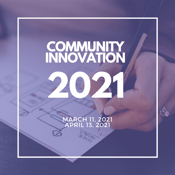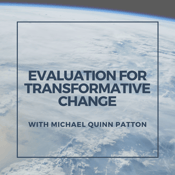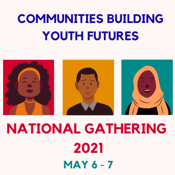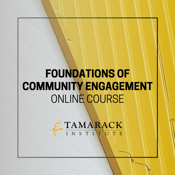Engage in Community Change
Tamarack Institute | March Edition, 2021
Welcome to Engage!
In this edition of Engage! we're excited to explore how cities and communities are taking a community-based approach to COVID recovery. Through our brand new publication 10 - A Guide for a Community-Based COVID-19 Recovery, you’ll explore 10 Really Good Ideas, 10 Inspiring Stories, and 10 Useful Resources to help you and your community as we grapple with recovering from this pandemic, and building back better.
SPECIAL Feature

Special Feature: Community-Based COVID Recovery
BY: PAUL BORN & LISA ATTYGALLE
10 - A Guide for a Community-Based COVID-19 Recovery is a beautiful 32-page booklet based on an idea hatched by the Tamarack Board and Co-CEO’s Liz Weaver and Paul Born while developing a ten-year strategy for Tamarack. As an organization we have spent many hours considering why and how cities and communities have become such a force in community change, especially now during COVID-19. With an eye to the future, this guide captures this momentum, attempting to do so in practical and useful ways.
This resource looks at how communities are recovering from COVID-19 in a variety of ways. We’ve included an assessment to help you gauge how your city is working toward a COVID-19 community-based recovery. This provides a baseline and will help you explore the ideas and stories included in the guide.
We’ve also included 10 Really Good Ideas for thinking forward at a city or community-wide level. These are some of the most universally applied ideas that we’ve seen through our work, and conversations with our learners and partners:
-
- An Opportunity to Unite! Don’t Let the Crisis go to Waste.
- Engage Your Community in Dialogue
- Create Innovative Ways to Inform Your Community
- Support and Mobilize Citizen Action
- Adapt and Respond to Emergent Change
- Take an Asset-Based Approach for Sustainable Change
- Build on Shifting Worldviews and Adopt Innovation
- Embrace a Collective Impact Approach
- Harness This Opportunity for a Just Recovery
- Build Community Resilience
You will also find 10 Inspiring Stories from our peers from coast to coast to coast, exploring how cities are working together and applying some of the ideas shared in the guide. Lastly, we’ve also included 10 Useful Resources for cities and communities interested in citizen-led community planning and innovation as you adapt and recover from COVID-19.
This has been a difficult year, but it is more important than ever to view our response and recovery to COVID-19 through a community-based lens. Cities across the country are already hard at work to ensure that we’re engaging communities, taking the opportunity for a Just Recovery, and putting people at the centre. Each of these cities has adapted their approach to their own context – people, culture, and place. We hope that these examples, ideas, and resources provide encouragement and practical tools for helping your own community.
Learn More:
- Read 10 - A Guide for a Community-Based COVID-19 Recovery
- Register for Developing a Community-Based COVID Recovery, a free webinar streaming live on March 17
Featured Case Study
 Creating A Circular Economy for a Greener Recovery
Creating A Circular Economy for a Greener Recovery
BY: PAUL BORN
Montréal is thinking differently to address the unprecedented impact of COVID-19 on the economy and people. Seeking a greener recovery, they are investing in a Circular Economy fund, giving support to social economy businesses, and reinventing economic development in their city.
Investing in a Circular Economy: In collaboration with the City of Montréal, Fondaction is preparing to launch a $30 million investment fund dedicated to a circular economy, a Canadian first, to support the economic recovery as well as the ecological transition in the metropolitan area. A circular economy is a "system of production, exchange and consumption aimed at optimizing the use of resources at all stages of the life cycle of a good or a service, while reducing the environmental footprint and contributing to the well-being of individuals and communities.” This new investment vehicle will finance and support innovative business models by integrating circularity principles, in particular to reduce greenhouse gas emissions or the production of residual materials. To begin, the fund is targeting the sectors that proved to be critical in Montréal during the pandemic, namely agri-food, waste management and sustainable mobility.
Support for Social Economy Businesses: The COVID-19 pandemic has created unprecedented challenges for social economy businesses in Montréal. Given the importance of these community organizations, the city is providing them with financial assistance, free advisory services, training and psychological support.
An Economic Recovery Plan: Montréal has implemented a recovery plan with twenty measures to support organizations, business owners and businesses in the Montréal agglomeration. The plan is the result of significant mobilization from Montréal’s business community and moves beyond a traditional recovery plan with three main objectives:
- Stabilizing and supporting the economy in the short term
- Reinventing the city’s economic development
- Mobilizing all partners for green and inclusive economic development
COVID-19 recovery requires many creative options and Montréal is working to not let this crisis go to waste. Investing in a green economy by reinventing their economic model is the way in which Montréal is building upon shifting worldviews to lift up their community and build toward a just and equitable future.
Learn More:
- Read about the Circular Economy Fund
- See how Montréal is providing support for social economy businesses
- Learn about Montréal’s Economic Recovery Plan
- Learn about 7 “Green strings” principles and guidelines that consider green recovery efforts and ongoing economic stimulus
- Register for Developing a Community-Based COVID Recovery, a free webinar streaming live on March 17
Feature Article
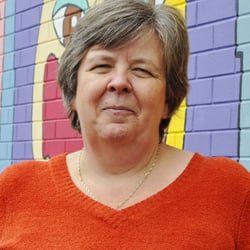 Deepening Learning and Connection in a Virtual World
Deepening Learning and Connection in a Virtual World
BY: LIZ WEAVER
In June 2020, Tamarack pivoted from our in-person workshop offerings to moving workshops into the virtual space. We knew it was going to be a challenge. As our team reflected on this opportunity, we noted that we wanted to create a virtual learning experience which was unique.
Tamarack in-person workshops have been the place where participants meet colleagues doing similar work. The work of community changemakers is challenging and sometimes feels lonely. Participants often expressed that the connections they made at workshops was pivotal to them.
We wondered if this experience of connection could be replicated virtually. In June 2020, Tamarack launched our online Foundations of Community Engagement (learn at your own pace) course and an virtual 3.5-hour workshop on Turf Trust and Virtual Collaboration.
As prototypes, these workshops and the others launched since, have exceeded our expectations. The small group size for the short virtual workshops enables participants to connect with each other. Small group conversations are threaded throughout the 3.5-hour workshop creating points of connection and deeper learning. Interactive tools such as Mural and polls are woven into the content.
Finally, small group coaching sessions are held one-month post workshop or during the Foundations course to answer questions, dive deeper into the workshop content or learn how participants are applying the content in their work. The coaching sessions are a way for Tamarack to hear directly from learners. One learner commented during a coaching session that the combination of practical content and coaching made Tamarack workshops unique.
Sherreta Harrison, Sustainability Catalyst at MetroMorphosis describes her teams experience participating in one of Tamarack’s virtual workshops on Collective Impact 3.0.
Our team thoroughly benefited from the time we spent with your team and feel better equipped to lead our change work. The tools shared, the presentation, and the ability to have conversation with so many diverse perspectives all have real import for the work we are doing in re-entry, education, economic inclusiveness and community change.
After six months of delivering workshops in the virtual space here are ten lessons learned.
-
- A virtual workshop is a global experience – participants have accessed the workshops from around the globe adding a richness and diversity to the learning space.
- A smaller number of participants in a workshop or post-workshop coaching creates a more engaged and connected learning experience.
- A technology support team is essential to help those less accustomed to navigating different platforms such as small group conversations, chat box engagement, Mural, polls, etc.
- A pre-workshop orientation to the technology tools can be helpful when introducing participants to unfamiliar technology. We include information and a short Mural exercise for those interested in accessing this tool before the workshop.
- The small group conversations are enhanced when facilitators are recruited in advance. We provide an orientation and training session for small group facilitators, so they are comfortable with their role.
- The workshop should have applied and practical activities and create spaces for participants to share their knowledge and resources.
- The workshop should provide multiple connection opportunities including small groups, chat box, polls and conversations.
- A participant workbook which includes an exercise to be done before the workshop and other resources is a great tool to keep participants engaged.
- A post-workshop coaching session is a practical way for participants to reflect on what they have learned and share their personal experiences about what works and does not work.
- The workshop provides an opportunity to keep connected with learners. We follow up multiple times providing additional resources to deepen the experience and content.
To Learn More:
Featured Event and Webinar
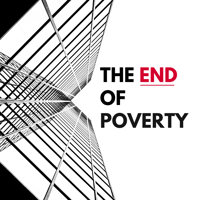 The End of Poverty Virtual Gathering
The End of Poverty Virtual Gathering
Virtual Summit | May 5-6, 2021
Join Tamarack’s Vibrant Communities online for two amazing days to explore The End of Poverty. Listen to keynote speakers like Melody Barnes who worked directly with Barack and Michelle Obama in the White House, and Calgary’s Mayor Naheed Nenshi who was named the second-most influential person in Canada. The End of Poverty gathering will bring together government, business, community and lived/living experience leaders from across Canada to celebrate our successes and co-generate solutions.
This event will feature engaging panels and workshops and daily small group discussions, each serving to help collectively advance ideas for ending poverty.
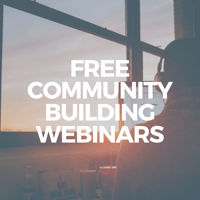 Developing Community-Based COVID Recovery
Developing Community-Based COVID Recovery
March 17, 2021, featuring Brock Carlton, Tamarack Institute Vice-Chair, Lisa Helps, Mayor of Victoria, and Berry Vrbanovic, Mayor of Kitchener
The impacts of COVID-19 have been profound. Communities have had to deal with incredible loss, businesses have suffered, children and families have struggle through a compromised education system, and our sense of well-being has declined. Throughout these challenges, we have seen incredible resilience from communities and cities.
Join Brock Carlton former CEO of Federation of Canadian Municipalities in conversation with Mayors Berry Vrbanovic (Kitchener) and Lisa Helps (Victoria) as they explore the resilience of community and look at examples of where communities are working toward recovery.
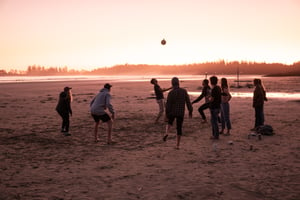 Are you a youth aged 15 to 30 who lives in Canada? Do you like to share your perspectives and vision through photography?
Are you a youth aged 15 to 30 who lives in Canada? Do you like to share your perspectives and vision through photography?
We are looking for original photos that explore the idea of prosperity and a future where young people in Canada thrive.
The Future of Prosperity
How will youth impact the future of prosperity? Will prosperity ensure better youth futures? How might prosperity end youth unemployment and poverty? How might we create a world with stronger connections for youth, opportunities to shrink the income gaps and have fewer “haves and have nots”? We would like you to explore the idea of prosperity through photos.
Why? We believe that we can learn a lot from youth. We believe that youth perspectives, beliefs, and visions for the future should shape our work and we want to share these with changemakers across the country.
- We will be selecting 10 photos to be part of an online gallery. This gallery will be virtually “toured across Canada” in May & June, 2021. If your photo is selected to be part of the online gallery, you will receive $500.
- We will be selecting 20 photos to be featured in our publications and newsletter. If your photo is selected to be published, you will receive $50.
All selected photos will be shown during our virtual conference in May and may be included in our reports and on our social media and web accounts.
Learn more about the photo contest rules and how to submit your photo here
***
 Es-tu un-e jeune âgé-e de 15 à 30 ans vivant au Canada? Aimerais-tu faire connaître tes perspectives et ta vision par l’entremise de la photographie?
Es-tu un-e jeune âgé-e de 15 à 30 ans vivant au Canada? Aimerais-tu faire connaître tes perspectives et ta vision par l’entremise de la photographie?
Nous sommes à la recherche de photos originales qui explorent le concept de prospérité et proposent différentes visions d’un avenir où les jeunes du Canada s’épanouissent.
L’avenir de la prospérité
Comment les jeunes influenceront-ils l’avenir de la prospérité? La prospérité assurera-t-elle un meilleur avenir aux jeunes? Comment la prospérité pourrait-elle mettre un terme au chômage et à la pauvreté chez les jeunes? Comment pourrions-nous créer un monde où les jeunes ont l’occasion de créer des liens plus solides et de réduire les écarts de revenus entre les personnes nanties et démunies? Nous aimerions que vous exploriez le concept de prospérité à l’aide de photos.
Pourquoi? Parce que nous croyons que nous pouvons apprendre beaucoup des jeunes. Nous croyons que les perspectives, les convictions et les visions que les jeunes entretiennent pour l’avenir devraient guider notre travail, et nous voulons les faire connaître aux agent-e-s de changement à travers le pays.
- Nous sélectionnerons dix photos qui seront exposées dans une galerie virtuelle. Cette dernière sera présentée lors d’une « tournée » virtuelle à travers le Canada qui s’étalera de mai à juin 2021. Si votre photo sera sélectionnée pour être exposées dans la galerie virtuelle, vous recevrez un prix de 500 $.
- Nous sélectionnerons 20 photos qui seront présentées dans nos publications et notre bulletin. Si certaines de vos photos sont retenues pour être publiées, vous recevrez 50 $ pour chacune d’elles.
Toutes les photos sélectionnées seront présentées lors de notre conférence virtuelle qui aura lieu en mai. Elles pourraient également être utilisées dans nos rapports, de même que nos comptes sur les médias sociaux et notre site web.
Striving for Community-Driven Anti-Racist Use of Race, Ethnicity and Immigration Data
Every time a resident of Ontario uses their health card, information is added to Ontario's population-wide health data picture. The Ontario government entrusts ICES with securely holding and analyzing this information to improve services that support the health of Ontarians. With their unique mix of data and research expertise, ICES has influenced real change in health care, such as helping to pull unsafe drugs from the market; informing laws that ban driver cellphone use; and identifying what works to improve ER services.
As the focus on the need for race and ethnicity data has increased in Ontario and more widely, the importance of collecting and using these data in a responsible manner is imperative. ICES recognizes the global and national impact of colonization and the role of data in decolonizing health research and dismantling systemic racism. As such, ICES is developing a framework to guide the appropriate use and governance of race and ethnicity data in health research.
ICES is working together with the Tamarack Institute and Digital Justice Lab to lead a Peoples’ Panel on how race and ethnicity data should be used for health data research in Ontario. The Peoples’ Panel will involve 30-60 diverse and representative individuals who will meet weekly for 5 weeks starting on March 17, 2021. We’re seeking regular people—no experience in health, science or policy needed—so if you have an interest in how race data is used, and especially if you identify as racialized individual, and live in Ontario we invite you to express your interest in being part of the Peoples’ Panel. Participants will be compensated.
Community Innovation 2021
Virtual Workshop
March 11, 2021 | Register for the March Workshop
April 13, 2021 | Register for the April Workshop
At Tamarack, Community Innovation is considered the most impactful of the 5 practices of community change.
Join Sylvia Cheuy for a new virtual workshop designed to provide you an opportunity to explore key theories, tools, and approaches in the practice of Community Innovation and equip you with the knowledge you need to ensure that innovation is intentionally incorporated into your community change efforts. how the Community Engagement landscape is changing and evolving.
Evaluation for Transformative Change
A new 4-part virtual workshop | April 20, 22, 27, and 29, 2021
Join Michael Quinn Patton and Mark Cabaj for this new virtual workshop series and explore how evaluation can help drive – rather than hinder – transformative efforts to address complex topics like climate change, equity and human survival.
Evaluating transformation requires new ways of conceptualizing and conducting evaluations. This series will offer principles for global systems transformation as a framework for assessing the likely adequacy of an initiative or intervention to be transformative.
Learn More and Register
Communities Building Youth Futures
2021 Virtual Gathering | May 6-7, 2021
Join 400 attendees to create connections between communities, our National Collaborative, youth serving organizations, and learners to explore how
- building youth futures is a critical step in ending poverty in Canada
- create space for youth as changemakers
- showcase emergent and innovative practices that build pathways to education and employment
Foundations of Community Engagement
Online Course | Access course materials anytime and learn at your own pace
Join Tamarack's Lisa Attygalle, Director of Community Engagement to build a foundation of knowledge and practice for your community engagement work.
Through video lessons, case studies, readings, and activities, you'll dig into the role of community, who should be engaged, community engagement techniques, how to overcome challenges, and how to evaluate your engagement activities.
This course is available to use at your own pace, but you'll be learning alongside a diverse group of over 300 Tamarack Institute learners, and have the opportunity to join Lisa for monthly small group coaching to get more personalized feedback and insight.
Developing Community-Based COVID-19 Recovery
Date: March 17, 2021
Speakers: Brock Carlton, Mayor Lisa Helps, and Mayor Berry Vrbanovic
Building Ecosystems for Positive Change
Date: March 24, 2021
Speakers: Tatiana Fraser, Rachel Sinha, and Liz Weaver
Monitoring Outcomes & Measuring Impact | Lessons from the Opportunity Youth Forum
Date: March 31, 2021
Speakers: Monique Miles and Sylvia Cheuy
Democracy - Government Doing With NOT For
Date: April 7, 2021
Speakers: David Mathews and John McKnight
Equity, Engagement, and Civic Leadership: How Does Your Community Rate?
Date: April 14, 2021
Speakers: David Chrislip, Patti Schmitt, and Liz Weaver
Culture, Collaboration, and Choice: A Values Approach
Date: April 28, 2021
Speakers: Russ Gaskin and Liz Weaver
